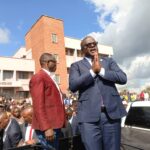The rise and fall of John Tembo
Published on April 29, 2013 at 7:26 AM by FACE OF MALAWI
Advisory: the life story of John Tembo is long and multi-faceted, hence, this write-up, cannot be short
The Basics:
He was born on Sept. 14, 1932 in the central region district of Dedza. His father, Zenus Ungapake Tembo, was a minister of the Church of Central African Presbyterian (CCAP).
By nature of his father’s occupation, young Tembo attended several primary schools before being selected to Blantyre Secondary School. He later went to study at the University of Romain in Lesotho, coming back in 1958 with a Bachelor of Arts degree in political philosophy.
He had a brief stint as a teacher at Dedza Secondary School and later taught for two years at Robert Blake Secondary School in the central region district of Dowa in 1958. Mr Tembo – who is married to Ruth and has three grown-up children.
He later did postgraduate studies in central banking in Britain, France and the United States before returning to take up the post of governor of the Reserve Bank of Malawi, which he held for 13 years.
Genesis of a life-long political career:
Tembo’s career as a politician sailed through the famous 1964 cabinet crisis that saw the fall of great politicians like Masauko Chipembere who died in exile in the United States; Orton Chirwa, who died in mysterious circumstances while in detention at Zomba Maximum Security Prison in 1993; and Kanyama Chiume, Banda’s number one enemy.
Up until 1992, he was the only one who survived, unscathed, through Dr. Hastings Kamuzu Banda’s era which saw men like Aleke Banda, Gwanda Chakuamba, and Bakili Muluzi fall out of grace with that regime.
He was viewed as Dr. Banda’s right-hand man and scholars and the South African Intelligence Reports allege that he made many unpopular decisions on the president’s behalf; and at times behind Dr. Hastings Kamuzu Banda’s back
The Renamo Connection:
A typical example was his pact with Renamo, which almost led to war between Mozambique and Malawi.
The long and short of it is that according to scholars and intelligence sources, John Tembo had a side-deal with Renamo – without Dr Kamuzu Banda’s blessings
Using the Malawi Police Secret Service and the Malawi Young Pioneers (MYP), he was availing Renamo of various facilities in its fight with the Frelimo government.
Why did he sink this low?
Apparently, so that in the event that Kamuzu died, Renamo should, in a
The underlying implication is that even then, John Tembo knew that he was not popular, hence preparing to wage war to secure power.
This was of course selfishness and abuse of office; and partially explains the rumour that he was “cursed” having made Dr Kamuzu Banda look foolish and not at all in control, in front of late Samora Machel and Robert Mugabe in 1984.
Cursed by Dr Banda: “You will never rule!”
Dr Banda, unaware of Tembo’s arrangement with Renamo, and that South African agents were flying in and out of the country at will with weapons and provisions for Renamo, and that Renamo rebels were being trained in MYP bases, in 1986 tried to tell Samora Machel off when Samora accused Malawi of supporting Renamo.
At a summit in Malawi, also attended by Robert Mugabe, Dr Kamuzu Banda was embarrassed when Samora Machel produced evidence that Kamuzu was unable to deny had originated from Malawi supporting Mozambique’s claims.
Aged Kamuzu, like a wounded lion, licked his wounds, did his home-work, and saw John Tembo’s signature all over the arrangement.
For some unfathomable reason, John Tembo escaped the normal chastisement of those days, to live until this day, under a curse.
Call it poetic justice if you will, Kamuzu is now having the last laugh.
JZU – today – has been reduced to licking presidents’ unprintables to secure a son’s job there, in-law’s appointment there and a nephew’s appointment over there.
This is the once “mighty” John Tembo, who was flying all over the place, leading “high powered delegations” now surviving on crumbs from Kamuzu Palace.
And this is why to guarantee his continued relevance and be of some use to the current tenant at Kamuzu Palace, he is refusing to voluntarily retire and unshackle the MCP.
Parliamentarian for life:
In 1960, two years after Dr. Banda’s arrival in the country from Ghana to lead the independence struggle from the British colonial rule, Tembo was invited to take up a parliamentary seat in Dedza South constituency, a seat he has never let go to this very day, and if he has his way, till death.
Road accidents galore:
When Malawi became a republic in 1966 after attaining independence in 1964, Tembo was appointed minister of finance after the person intended and groomed for the post Dunduzu Kaluli Chisiza died in a mysterious road accident.
Unknown to many at that time “road accidents” would later be on the epitaphs of anyone who crossed Tembo’s path. For fear of opening old wounds, I will leave this at that.
Suffice to say that by 1992, Tembo had become the strongest politician after Dr. Banda.
The peak:
At his peak, he chaired many private and public institutions, including Malawi’s largest conglomerate, Press Corporation Limited, as well as Blantyre Print and Packaging, the University of Malawi, Air Malawi, the New Building Society and several banks.
He was member of the Central Executive Committee and Treasurer General of the MCP; later became minister of state in the President’s Office – a post which gave him direct access to Dr. Banda while other ministers and even the secretary to the president and cabinet had to go through him to see the president.
The Tembo Supremacy:
Jealous down,
Several organizations and institutions, now either closed or facing serious existential challenges, were thriving in equally turbulent times, under his chairmanship.
Air Malawi, the Malawi Housing Corporation (MHC) – recently a source of cheap houses for the elites, the Press Corporation Limited (PCL), Blantyre Newspapers Limited (BNL) – now offloading journalists en masse, the defunct Malawi Development Corporation (MDC), the National Bank, the Commercial Bank – I could add several others, performed very well – under his watch.
The fairer looking of the opposite sex, who worked with or more appropriately under him, also have stories to tell. And most of the stories, are devoid of romance as we know it, but rather border on what is today commonly called sexual harassment.
JZU Tembo, it is claimed by women in the know, has more than the three children he publicly acknowledges.
But after all has been said and written, whatever methods John Tembo was applying using with respect to oversight of the institutions he headed, is minus the sexual harassment, what has been missing of late.
Some of the institutions listed above are now extinct.
With the advent of multi-party democracy, board members are appointed based solely on party or tribal affiliation; and their performance and effectiveness assessed against the wrong set of criteria i.e. their contribution to a party or tribe, to the detriment of national wealth.
This is what has, in part, contributed to the deterioration of the foundation that the founding father, dictator, his excellence the Life President, Ngwazi Dr Hastings Kamuzu Banda, the Lion of Malawi, D.O.F. erected.
We will shelve this for a rainy day, today let’s focus on John Tembo.
Quod scripsi, scripsi
Back to the other side of midnight, when in 1992, Catholic bishops issued a Lenten pastoral letter
The convention unanimously resolved to assassinate the bishops but the plot was never carried out because of the power of prayer, the media and the outside world.
Turning of the tables:
The United Democratic Front (UDF) government, which ousted the MCP from power, prosecuted Tembo for masterminding the assassination plot but the would-be-victims (the bishops) asked the state to drop the charges because as men of God they did not believe in waging a vendetta against him.
The courts also cleared Tembo of involvement of a high profile political assassination of three cabinet ministers and an MP in the epic Mwanza Murders Case in which he was implicated as masterminding the death of ministers Dick Matenje, Aaron Gadama, Twaibu Sangala and MP David Chiwanga in a make-believe road accident for dissent – Idi Amin Dada of Uganda-style.
Tembo outwits Chakuamba:
Following the death of Dr Banda, John Tembo with help from unlikely quarters, in the name of Bakili Muluzi, wrestled power from his life-long political rival Gwanda Chakuamba, who had been anointed MCP leader by late Dr Banda.
2004 Elections:
Tembo contested and failed to win the 2004 elections; mainly because his nemesis Gwanda Chakuamba, broke away from MCP to lead the Mgwirizano (Unity) Coalition after forming his own Republican Party.
Gwanda’s Mgwirizano coalition; effectively split the opposition vote and enabled Bingu wa Mutharika to win with a small margin.
The combined votes of MCP and the Mgwirizano Coalition were enough to beat UDF’s candidate Bingu wa Mutharika.
2009 Elections:
His chances of winning the 2009 election were boosted when following some marvellous political engineering, former President Bakili Muluzi outmanoeuvred his United Democratic Front (UDF) into not contesting in the election at presidential level.
The UDF entered into a joint MCP/UDF coalition with Tembo as the presidential candidate. The Tembo and Muluzi alliance was trounced, ruthlessly, by Bingu wa Mutharika’s DPP.
As presidential candidate for the Malawi Congress Party, Tembo was touting on his long experience in government and the private sector during the MCP’s uninterrupted 30 years under the late dictator, Dr Hastings Kamuzu Banda, and a loyal vote from his stronghold – the tobacco heartland of Central region – to make it to State House.
Mutharika save for the Eastern Region, a UDF stronghold, swept the Southern Region, did enough damage in the central region to raise questions as to Tembo’s supremacy in the region, and secured an amazing 98% of the vote in the northern region.
President Bingu wa Mutharika swept to a 66% victory, while Mr Tembo could only muster 31% of the vote. Mr Tembo refused to accept defeat, claiming the elections had been rigged.
MCP launched a formal complaint with the electoral commission; which did not go very far because it is a difficult feat to rig 66% of the vote, without leaving a trail of evidence.
And John Tembo had nothing worth calling evidence. Tembo, in 2009 was beaten, fair and square.
“Twice he has contested, and twice he has lost, what is he talking about?
Time for a ride to Zomba Mental Hospital perhaps? We would not want to be ‘too late’ would we? Let us not get too worried, I suppose JZU is spending far too much time watching Rowan Atkinson’s – a good movie to watch and repeat, at his age.
Life after 2009:
Tembo, as the leader of the party with the largest number of parliamentarians after the winner, reverted to his now familiar role of leader of opposition.
At 77 in 2009, he was the oldest among the seven candidates who vied for the presidency and in all honesty, 2009 should have been his last bid.
Again, as per the Malawi Congress Party’s constitution Section 36 John Tembo after trying his luck twice and failing, no longer qualifies to stand in the 2014 election as the MCP’s presidential candidate.
But apparently, Tembo thinks otherwise.
John Tembo cannot stand again!
After the weird indefinite postponement of the MCP convention, I had my own reservations and sought counsel of four lawyers, Z Allan Ntata – former presidential aide, Bright Theu – a practicing lawyer and two others, who have preferred anonymity.
Read on:
Wise One:
“I have heard from an insider that John Tembo has a deal with the current president that should he win the MCP presidency, he should partner the current ruling Peoples’ Party (PP) in 2014 towards a decent “retirement package” – which could potentially benefit him personally but at the expense of the MCP.
And I suspect there is more than meets the eye, on this postponement. There is a hitch; I just cannot put my finger to. Can you shed some light vis-a-vis the Laws of Malawi?”
Z Allan Ntata:
“If they had tried to use those regulations this week, they would have been liable to a statutory challenge because the Registrar of Political Parties must be informed of political party constitutional changes at least seven days before those changes are used – something like that, I have forgotten the accurate regulation…”


